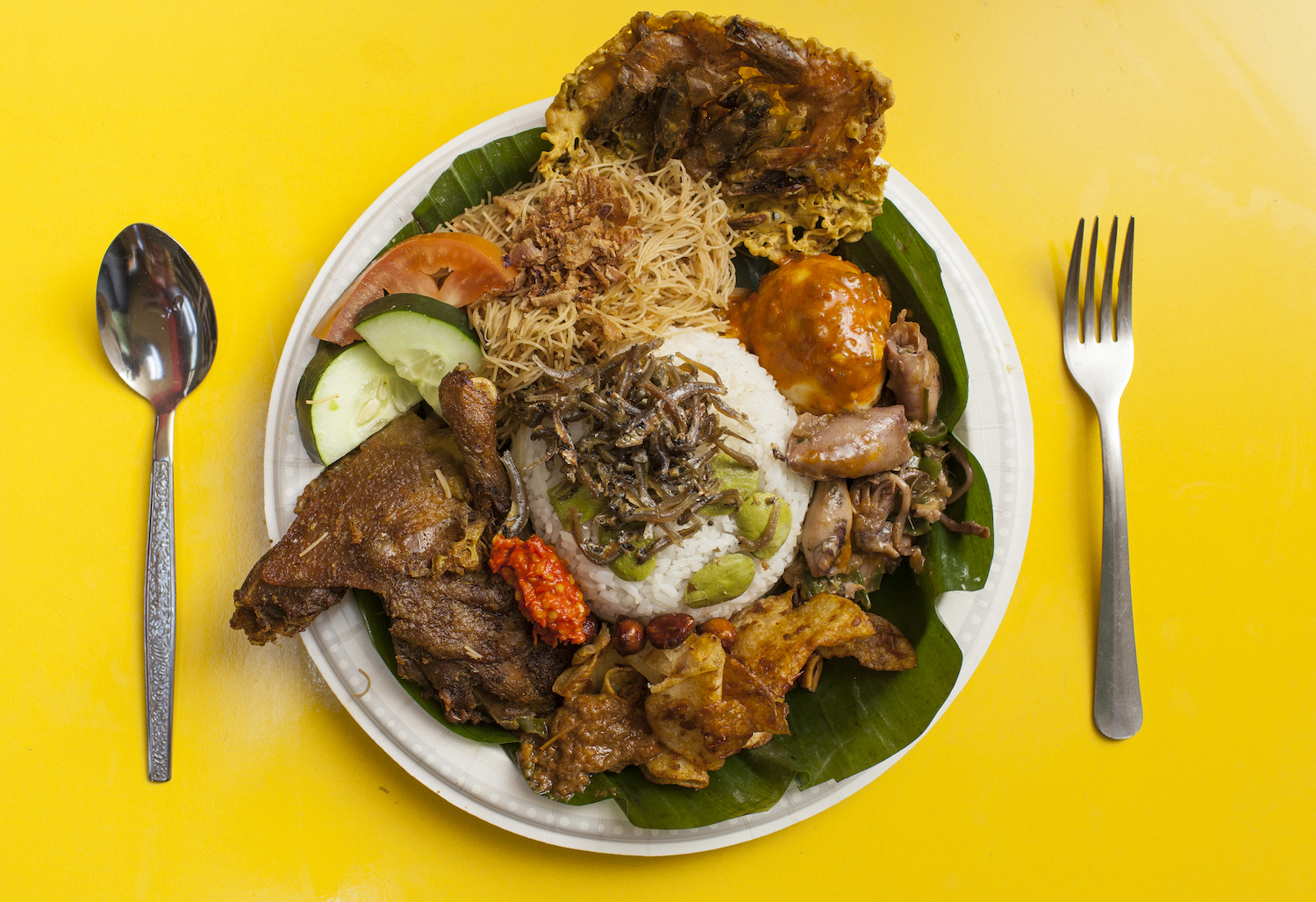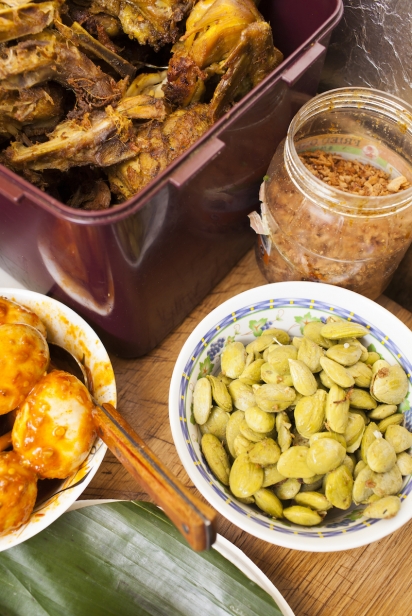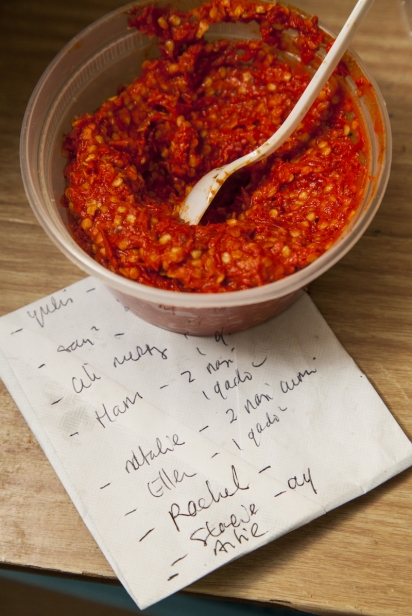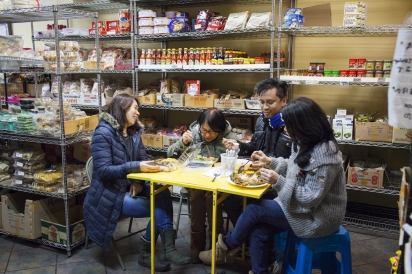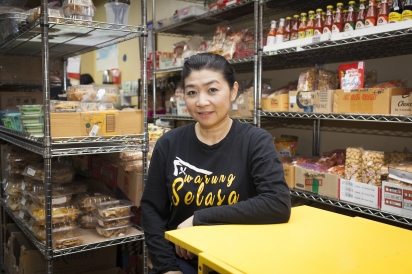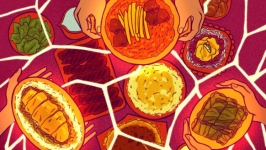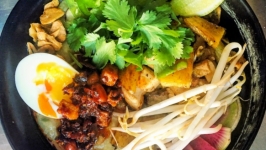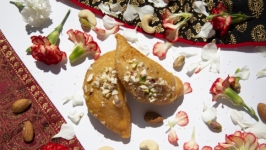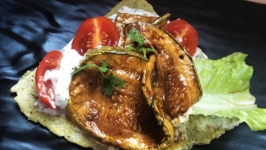Sambal, Spice and Everything Nice Tuesdays with Chef Tjahajadi
Editor's Note: This article was written before the COVID-19 crisis for what would have been our print Women's Issue. The Warung Selasa pop-up is open for pickup on Tuesdays. Follow @warungselasa for updates.
“You like spicy?” Anastasia Dewi Tjahjadi asks, laden with grocery bags bursting with chilis. The small ones are a riot of precarious reds, oranges and yellows; the long hot ones, a sober deep green. She’s just bought a sackful for a song from an Indian grocery in Jackson Heights.
She’ll freeze these zingers and eventually transform them into sambals, the hot sauces that are a cornerstone of Indonesian cuisine, garnishing the dishes served at her weekly pop-up, Warung Selasa. The name means “Tuesday pop-up restaurant,” and since 2016 its solitary yellow table—tucked into the Elmhurst Indonesian grocery Indo Java—has gained renown as not only one of the smallest eateries in New York but a beloved must-visit for authentic Indonesian home cooking.
For $10, diners get a plateful of whatever Tjahjadi made that week, driven by seasonality and availability. Recent plates from the grocery’s “love kitchen” (it fits two people) have included young jackfruit cooked in palm sugar coconut milk; shrimp potato stew; turmeric beef soup with tripe; steamed fish with shredded mangoes; and spicy lemongrass hardboiled eggs. All this from a microwave and three electric burners. The entire experience, overseen by Tjahjadi, is intimate and welcoming, like eating in a friend’s kitchen.
Tjahjadi, 50, began cooking in 2003, a few years after arriving in New York. Having trouble making ends meet as a working new mom with a child in daycare, she started selling small jars of sambal at her church. They were a hit—then people started requesting certain dishes. She hadn’t cooked much besides in college when she lived alone, but it was something she could do while home with the baby. And she knew just who to call for help making it taste perfect.
Growing up in Indonesia’s second-largest city, Surabaya, Tjahjadi shadowed her mother in the kitchen. Making dishes from scratch was paramount, and it was hard work. She remembers the toil of making coconut milk, grating down the coconut (and her fingers). But she maintains the laborious traditional ways of cooking.
“The old recipes are better,” she says. “Now it’s, like—put everything in the pressure cooker.” She can taste the difference. “I like the old way.”
Others liked it too. She began taking orders for mie ayam (a chicken noodle dish) from friends and at church—all sold out quickly. Then someone suggested she put a table in her house for people to sample her cooking. Enough weekday visitors came that she had to hire an auntie to help. Her mother, back in Indonesia, continued to help refine recipes via phone and dispatched vital ingredients by airmail.
After four years of this informal canteen, she opened a restaurant, Java Village. (She’d started a small grocery a block away the year before; it later became Indo Java.) Back in Indonesia, she was a secretary and worked in sales; she never imagined she’d become a restaurateur.
Tjahjadi bubbles with girlish ebullience, smiling often and laughing easily. But the light flickers when she discusses leaving Indonesia. In 1998 she was living in Jakarta with her husband. His father owned a business in the city’s Chinatown, near where riots broke out that May, triggered by mass unemployment and food shortages, and directed at Indonesians of Chinese descent. The violence and unrest eventually toppled President Suharto’s 31-year dictatorship.
“The situation was very scary,” she recalls. “It just suddenly happened.” There was no electricity. They stayed inside for a month. Friends began moving to the United States for a new future; one offered an empty room in New York. She and her husband applied for asylum and received it the next year, part of an estimated 100,000 who fled Indonesia during the late 1990s. Some 7,000 were granted asylum in the United States.
An avid Beverly Hills, 90210 viewer, Tjahjadi was shocked by their new, modest home in Corona. “I’m, like—wow, this is a big difference from Beverly Hills,” she laughs. “It was small—it was really bad.” Her neighbors were mostly immigrants, speaking Chinese and Spanish. “I didn’t see any American people.”
The Indonesian community back then was sparse. She remembers just one Indonesian restaurant at the time, Bali Nusa Indah in Hell’s Kitchen, which closed last year. “That is not authentic… they made it taste like American food.” Instead they visited Malaysian restaurants for dishes similar to Indonesian ones.
Today, Warung Selasa is one of the city’s growing number of Indonesian eateries, in addition to the monthly Indonesian Food Bazaar in the community’s Elmhurst epicenter. Like Tjahjadi, about half of the 8,000 Indonesians in the New York area are ethnically Chinese, and 60% are Christian.
She hasn’t returned to Indonesia since she left 20 years ago, but she plans to, finally, this year. “I’m lucky to live here because, even if I’m not rich, I can do everything,” she notes. “But in Indonesia, if you’re not rich, you cannot do anything.”
After Java Village closed three years ago, customers missed her food. Someone suggested she spend a day cooking for those regulars. “Just once a week—why not?” she recalled thinking. The small kitchen restricts how much food she can serve, but despite media attention and devoted diners, she has no plans to expand to more days or open another restaurant. Today Tjajadi works full time as a private chef and nanny for an American family in Manhattan; Tuesday is her day off. They don’t know about Warung Selasa.
She still calls her mother for recipe help. But even with all the right ingredients, she hasn’t successfully replicated her favorite dish: ayam bumbu rujak, or grilled chicken in coconut milk. “I tried, but it’s still not the same taste.” Tjajadi suspects that may be because her mother grilled the chicken over charcoal or the coconut milk here comes from a can.
Regardless, she still fills about 80 orders each Tuesday, often selling out in four hours. Now about 40% of her customers are non-Indonesians; many are Korean and Indian, sharing an affinity for spicy foods. And her most popular dish? “Everything with chili,” she laughs.
Warung Selasa | @warungselasa
8512 Queens Blvd #1, Elmhurst
(718) 779-2241


